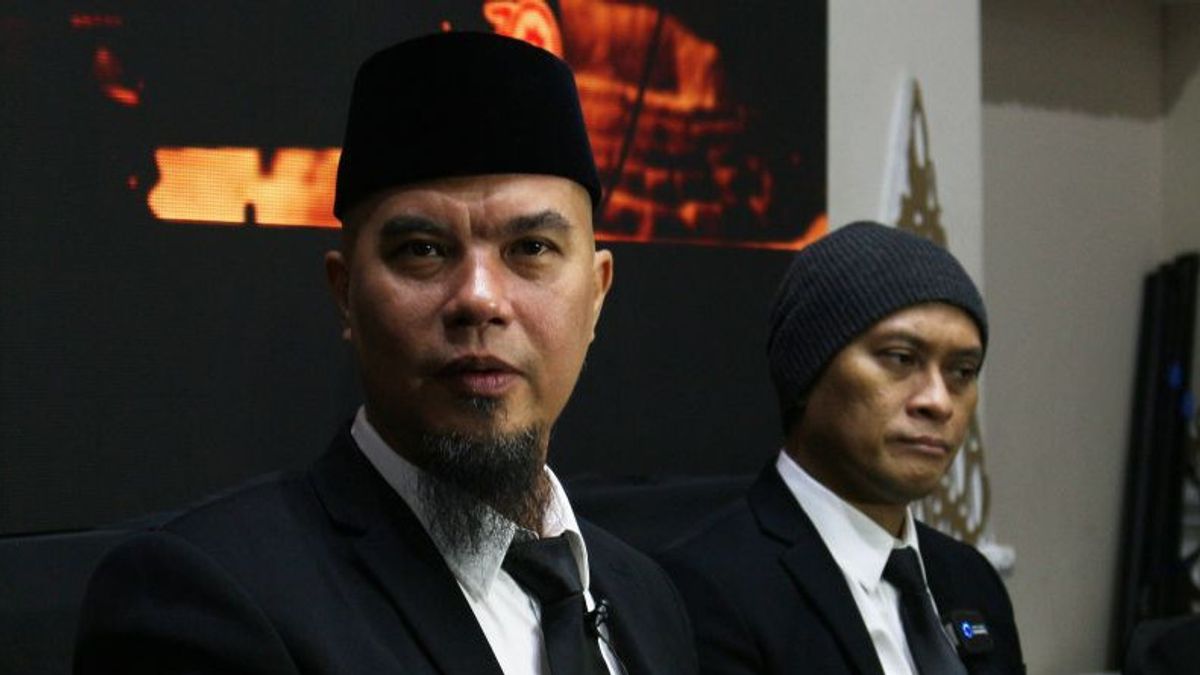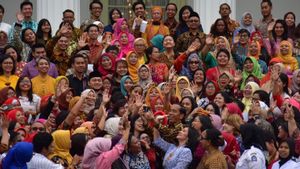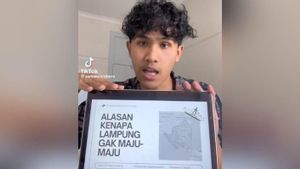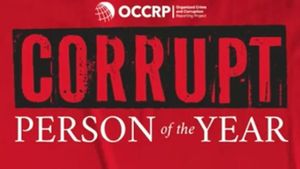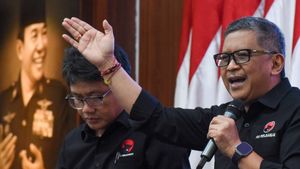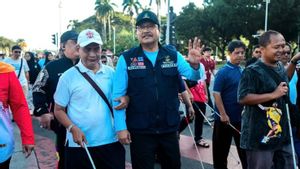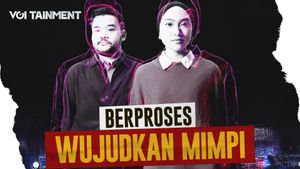JAKARTA The polemic regarding copyright royalties for songs resurfaced after Ahmad Dhani spoke out loud asking Event Organizers (EO) to pay royalties if the artist sang Dewa 19 songs during the show. EO is no exception for holding Once Mekel performances.
He will also take firm action for the EOs who remain stubborn. Because, this is a violation of violating the applicable rules.
"While at WAMI (Indonesian Music Authority), I have also reminded that. How many times have I spoken," said Dhani, the frontman of the Dewa 19 group in his official statement.
The rule referred to by Dhani is Government Regulation Number 56 of 2021 concerning Management of Song and/or Music Copyright Royalties.
Article 3 of the regulation states that everyone can make commercial use of songs and/or music in the form of commercial public services by paying royalties to creators, copyright holders, and/or owners of related rights through the National Collective Management Institute (LMKN).
The forms of commercial public services as referred to include commercial seminars and conferences, restaurants, cafes, pubs, bars, bistros, nightclubs, and discotheques, music concerts, airplanes, buses, trains, and ships, exhibitions and bazaars, cinemas, telephone waiting tones, banks, and offices.
Also, shops, recreation centers, television broadcasting institutions, radio broadcasting institutions, hotels, hotel rooms, hotel facilities, and karaoke businesses.
He also encouraged the National Collective Management Institute (LMKN) to continue to play an active role in the collection and distribution of royalties. So that in the future, royalty management can run better.
There are no more musicians who experience suffering such as Yon Koeswoyo, vocalist and guitarist Koes Plus who have difficulty paying for hospital treatment and treatment in their old age.
Or like Syam Permana, a popular dangdut songwriter in the 90s who had to become scavengers to meet his daily needs because money from royalties was far from sufficient. In fact, Syam's songs were sung by the country's famous dangduts such as Meggy Z, Hamdan ATT, Ine Shintya, to Inul Daratista.
Currently, said LMKN License Manager Yessy Kurniawan, LMKN has formed an Online Pelinsesian Administration System in which there is information regarding a database for the use of songs, commercial users, finances, and licenses ranging from royalty calculations to license certificates.
That way, EO and other copyrighted users can easily pay royalties.
They can immediately get an electronic certificate from LMKN as a certificate of royalties that has been paid through the system. As a result, the distribution of the money paid by EO was directly passed to the song owner," Yessy said in a Public Discussion and Press Conference with DKI and LMKN in Jakarta on April 6.
So that later, there is no reason for EO not to report the list of songs or music to be played.
Director of Copyright and Industrial Design of the Directorate General of Intellectual Property (DJKI), Anggoro Dasananto also reminded that the royalty management mechanism with the issuance of Government Regulation Number 56 of 2021 is through LMKN.
So, to obtain these royalties, the creator or creator of the creation must first combine themselves to LMKN.
"The distribution of royalties is important to improve the welfare of Indonesian musicians. The mechanism, yes, first join LMKN," he said on the same occasion.
The problem is, there are still many songwriters who do not agree on the management of royalties by the LMKN. The Indonesian Songwriter Musician Alliance (AMPLI) alone had asked the government to cancel Government Regulation No. 56 of 2021 and Permenkumham 20 of 2021 which regulates royalty governance.
The reason AMPLI emphasizes the mechanism for the formation and management of song and music centers known as the Song and Music Information System (SILM) by the private sector.
Providing SILM authority to private institutions such as perpetuating the practice of taking over state functions by companies focused on profit.
"Not in the Copyright Law Number 28 of 2014 royalty issues, it should be managed and handled transparently by non-commercial institutions, right?" wrote AMPL in his petition entitled 'Revolutionary of the Indonesian Music Industry Starting from Royalty'
The Law of the Republic of Indonesia Number 28 of 2014 concerning Copyright has provided a legal basis for the establishment of a Collective Management Institute (LMK) in the form of a non-profit business entity as well as an LMKN in the form of a government aid institution as an institution for attracting, collecting, and distributing royalties.
This means that the legislators have fully realized that the issue of royalties as a mandate from the creator, must be managed and handled transparently by non-commercial institutions.
In fact, Permenkumham 20 of 2021 as the implementing rule of Government Regulation Number 56 of 2021 actually allows third parties in the form of corporations to be included in royalty management. In fact, given wider authority.
So that the role of corporations is not only as vendors to build SILM, but also to take over all LMKN authorities and functions with attributes as daily implementers.
Not to mention there is an additional 20 percent of the new cut as operational funds. Obviously contrary to the Copyright Law and is very detrimental to songwriters," said AMPLI initiator Indra Lesmana in his official statement in 2021.
The corporation in question is PT Lentera Abadi Solutama (PT LAS). In May 2021, LMKN formed a partnership with PT LAS. AMPLI accused the appointment of PT LAS of interest because it was not through tender. The process is also not transparent because it does not involve musicians and songwriters.
Now the implementing rules have changed to Permenkumham No.9 of 2022. However, AMPLI in an open letter in July 2022 still considers this not to answer the various problems caused by the previous implementing rules and their implementation.
The only thing that is encouraging is the return of pieces of operational funds which in Permenkumham 20 of 2021 will change to 40 percent, again changed to 20 percent in Article 22 and not contrary to Law on Copyright No.28 of 2014.
As for the involvement of the private sector, it is still unclear. Permenkumham 9 of 2022 has indeed changed the article stating that the daily executor can be in the form of a legal entity engaged in finance, management, information technology, licensing, royati management, and/or law in the previous implementing regulations.
Replacing it with daily executives comes from professionals who have experience in managing Royalties in the field of songs and/or music; representatives of LMK who are not commissioners of LMKN; and elements of the government that carry out management and supervision in the field of copyright and related rights. As stated in Article 9 paragraph (3).
The daily executive is led by a general manager appointed by the chairman of the LMKN commissioner through an open selection mechanism.
However, how is the Cooperation Agreement (PKS) between LMKN and PT Lentera Abadi Solutama (PT LAS) listed in the previous implementing rules?
Is the cooperation agreement with a third party, namely PT Lentera Abadi Solutama (PT LAS) automatically canceled with the enactment of Permenkumham No.9 of 2022? Is the daily implementing function of PT LAS decided based on Permenkumham No.20 of 2021 also automatically canceled?
If it is canceled, what about the responsibility of operational funds-which can reach 40 percent of the total royalties collected by PT LAS?
Although only about one year, the collection of royalties carried out by PT LAS caused various problems in the field, it was proven by the rejection of royalties collected by PT LAS, by one of the LMKs. If left protracted, worried that it would cause distrust and confusion among fellow NGOs and also between songwriters and related rights holders to LMK.
また読む:
"Strictly, we want the cooperation agreement between LMKN and PT LAS which refers to Permenkumham No. 2021 to also be canceled, because the appointment process is not transparent and is contaminated with conflicts of interest," wrote AMPLI.
It's also good to be more independent, the government element in LMKN is eliminated. AMPLI considers, 'The referee shouldn't play a role as a player.'
The English, Chinese, Japanese, Arabic, and French versions are automatically generated by the AI. So there may still be inaccuracies in translating, please always see Indonesian as our main language. (system supported by DigitalSiber.id)
